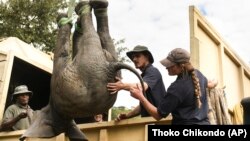In Zimbabwe, officials have begun moving more than 2,500 wild animals from the south to the north.
This move is to rescue the animals from a severe lack of water caused by climate change. The lack of water, or drought, has now replaced illegal hunting, called poaching, as the biggest threat to wildlife.
Among the animals being moved are about 400 elephants, 2,000 impalas, 70 giraffes, 50 buffaloes, 50 wildebeest, 50 zebras, 50 elands, 10 lions, and a pack of 10 wild dogs.
Called “Project Rewild Zambezi,” this is one of southern Africa’s biggest live animal capture and relocation efforts.
What does such a huge effort look like?
A helicopter helps to round up thousands of impalas into a closed area. A mechanical device lifts medicated upside-down elephants into vehicles. Teams of rangers drive other animals into metal cages. Finally, a long line of trucks starts a journey of about 700 kilometers to take the animals to their new home.
It is the first time in 60 years that Zimbabwe has had such a mass movement of wildlife inside its borders.
Between 1958 and 1964, when the country was white-minority-ruled Rhodesia, more than 5,000 animals were moved in what was called “Operation Noah.” That operation rescued wildlife from the rising water caused by building a large dam project on the Zambezi River. The dam created one of the world’s largest man-made lakes, Lake Kariba.
This time, the lack of water has made it necessary to move wildlife. Tinashe Farawo is a spokesperson for the Zimbabwe National Parks and Wildlife Management Authority. He said the environment, or habitat, has become too dry from long periods of no rain. The park agency issued permits for the animals to be moved. He said this is to avoid “a disaster from happening."
“For years we have fought poaching and just as we are winning that war, climate change has emerged as the biggest threat to our wildlife,” Farawo told The Associated Press.
He said, “Many of our parks are becoming overpopulated and there is little water or food. The animals end up destroying their own habitat….” They become a danger to themselves and to neighboring human areas as they look for food. The result, he said, is a constant “conflict.”
Another idea would be to reduce the number of animals. But conservation groups protest such killings. Farawo said that Zimbabwe last did this in 1987.
The effects of climate change on wildlife are not only happening in Zimbabwe. Across Africa, national parks are increasingly threatened by below-average rainfall and new building projects. These parks are home to wildlife such as lions, elephants, and buffaloes.
One of the new homes in Zimbabwe for the animals is Sapi Reserve. This privately-run reserve is east of Mana Pools National Park, a UNESCO World Heritage Site. It is known for its beautiful setting along the Zambezi River.
I’m Anna Matteo.
Farai Mutsaka reported this story from Harare, Zimbabwe. Anna Matteo adapted it for VOA Learning English.
_________________________________________________________________
Words in This Story
relocation – n. to locate again : establish or lay out in a new place
ranger – n. a person in charge of managing and protecting part of a public forest
journey – n. an act or instance of traveling from one place to another
emerge – v. to rise from an obscure or inferior position or condition
conservancy – n. an organization or area designated to conserve and protect natural resources
reserve – n. an area of land set apart : a nature reserve
_________________________________________________________________
We want to hear from you. Do you have a similar expression in your language? In the Comments section, you can also practice using any of the expressions from the story.
We have a new comment system. Here is how it works:
Write your comment in the box.
Under the box, you can see four images for social media accounts. They are for Disqus, Facebook, Twitter and Google.
Click on one image and a box appears. Enter the login for your social media account. Or you may create one on the Disqus system. It is the blue circle with “D” on it. It is free.
Each time you return to comment on the Learning English site, you can use your account and see your comments and replies to them. Our comment policy is here.







Forum